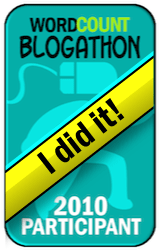I mentioned in my previous post that I favored Aartie Sequeira's comment on her definition of success, that at the end of her life on earth, she hopes God will appear to her and say, "Well done, my good and faithful servant." When I read it, it stopped me. It gave me pause to consider my own life. It made me think of humility, responsibility, authenticity, and about giving up the ego in favor of living life for the larger good and the higher power. To me, it's a very calming statement, even a meditative one. Imagine spending a few moments at the end of every day asking yourself if you had served the day well. What would your answer be?
Corinne Trang, known as the "Julia Child of Asian Cuisine," inspired me with this thought:
"I’ve learned to deal with life’s ups and downs by taking full responsibility for my actions. In other words, I point the finger at myself. In that way I experience a higher form of happiness and freedom."This is exactly what I learned while developing my B.I.K.E. philosophy. Taking personal responsibility for your own actions means you worry less about what others are doing or saying. It is definitely freeing. Your burdens are less and happiness naturally increases. Of course, this is a daily practice. It is not something that can be learned and set aside. It is a daily practice, a lifestyle choice.
Andrea King Collier, an essayist I admire, gets witty on us, describing how she deals with writer's block. She says an inner voice threatens, “If you don’t get your behind in that chair and start typing something, you are going to have to get a job swinging from a pole, and nobody wants to see that.”
Yes, an inspiring woman should make us laugh.
"What inspires you to cook?" Bhide asks Daisy Martinez, another Food Network star who specializes in Latin cuisine. Her answer takes me back to my bike rides. "Strangely, quite a number of things," she tells Bhide, "I can be ecstatically happy, or seriously sad."
And then she comes to the part that validated something in me: "The kitchen is my temple and the cutting board the altar." This is exactly how I felt on my rides when I was working my way through my divorce. My bike was where I prayed, where I laid out my life, got in touch with my vulnerabilities. And Martinez goes on to say, "Cooking those meals and kissing my children were the only things that saved my sanity during those darkest of days." Substitute "bike rides" here and leave in the "kissing my children," and you have what brought me to this blog to write about overcoming life obstacles and taking on new adventures. It's moments like these when I realize how truly connected we all really are. If we're clued in, we operate from the same set of feelings. I love that about human nature.
Something I'd like to debate...And this is probably going to sound out of character, since I'm generally a pretty happy, smiley-face kind of gal. But if I ever had the opportunity to meet in person Dana Cowin, the editor-in-chief of Food & Wine, whom Bhide interviews for her ebook as well, I'd have to ask her why she puts so much emphasis on everyday happiness as a measure of success (You'll have to read Bhide's ebook to see what I mean). I don't personally think it's possible. Life happens. Things get in the way. And I'm a firm believer that you must experience the yin in order to appreciate the yang, and vice versa. Somewhere recently I also read that we are born to struggle. If that's true, I wonder if this editor can ever actually achieve success according to her definition. As for me, personally, I expect and want to feel the full range of emotions as appropriate, and this is why I'd like to discuss this topic further with Cowin, just out of natural curiosity. There were several others whom Bhide interviewed that expressed a similar opinion, so it would be great fun to get us all in a circle and chat this one out.
Elise Bauer's story, on the other hand, made me cry. "I learned that what makes a beautiful life is being surrounded by people who deeply love you, who you love dearly in return," she says of the lesson learned from having spent seven years as an adult with an illness living with her elderly parents. During that confining time, she developed her food writing passion. She also gained a greater appreciation for the value of life, which is understandable and something to be admired.
I could go on and on, but Bhide's book covers more than 50 women's interesting insights--each of them inspiring in their own way. See if anything I noted here reaches you in some way. If it does, post a comment below. Or tell us how you've been inspired by an interview you've read lately. What was it about this person's words or responses that spoke to you?













No comments:
Post a Comment